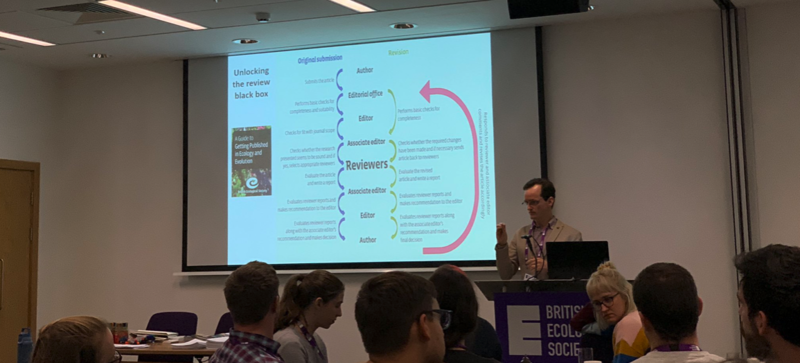BES 2019: the hangover
This year the SalGo Team represented its research in quite a few arenas at the BES 2019 Belfast, including our work on functional traits, senescence, demographic buffering, and macro-ecology. It was the first time for quite a few of the members attending this conference. Below, a few reflections on the conference (together with some multi-lingual translations)
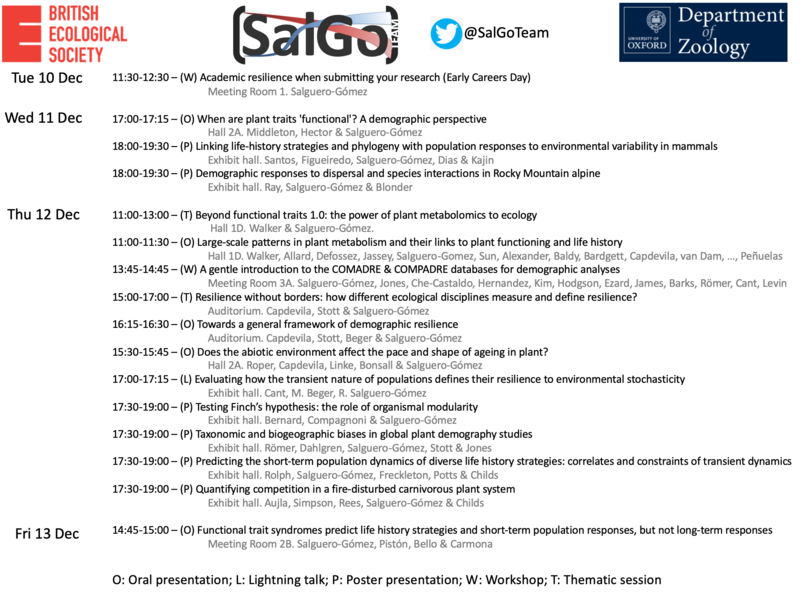
Mark Roper (PhD student)
My favourite part of the conference was receiving feedback from my talk on the effects of the abiotic environment on the pace and shape of ageing in plants. The feedback was constructive, and has provided me with a new sense of stimulation for advancing the analytical part of the work.
[ESP] Mi parte favorita de la conferencia fue recibir comentarios de mi charla sobre los efectos del ambiente abiótico sobre el ritmo y la forma del envejecimiento en las plantas. La retroalimentación fue constructiva y me ha proporcionado un nuevo sentido de estimulación para avanzar en la parte analítica del trabajo.
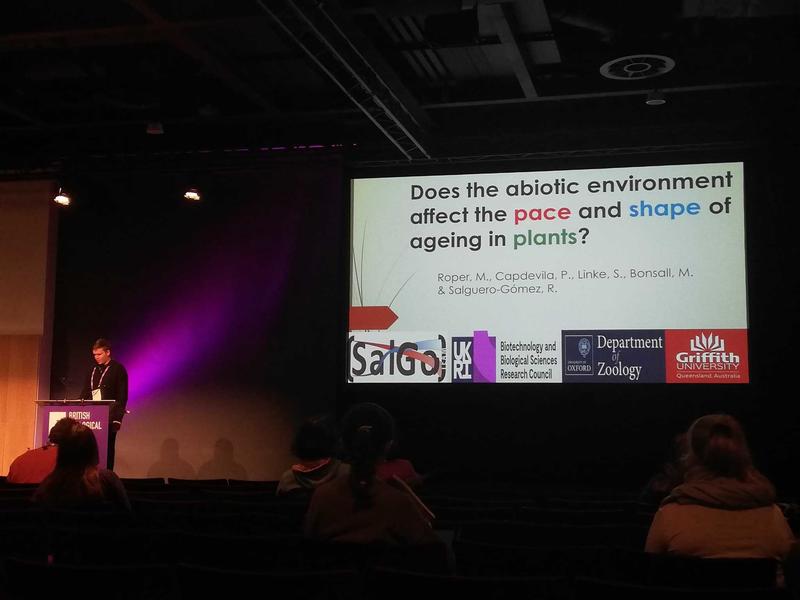
Sara Middleton (PhD student)
It was my first time at BES, and it did not disappoint! There were many high-quality presentations and I enjoyed hearing talks on different aspects of functional traits from measuring root traits to testing trait values between databases and field measurements. I particularly enjoyed meeting people from my undergrad and master courses who I hadn’t seen in years. The highlight was probably organising the joint social event with Invasion, Parasite and Aquatics SIGS! Over 60 people came and we had a whale of a time with a quiz. It was also great to see my article on bananas make the cover story of the Niche magazine. Looking forward to BES 2020 in Edinburgh!
[ITA] Era la mia prima volta al BES e non mi ha deluso! Ci sono state molte presentazioni di alta qualità e mi è piaciuto ascoltare i discorsi su diversi aspetti dei tratti funzionali dalla misurazione dei tratti della radice al test dei valori dei tratti tra database e misurazioni sul campo. Mi è piaciuto particolarmente incontrare persone dei miei corsi di laurea e master che non vedevo da anni. Il momento clou è stato probabilmente l'organizzazione dell'evento sociale congiunto con SIGS Invasion, Parasite e Aquatics! Sono arrivate oltre 60 persone e abbiamo avuto una balena di un tempo con un quiz. È stato anche bello vedere il mio articolo sulle banane fare la copertina della rivista Niche. In attesa di BES 2020 a Edimburgo!
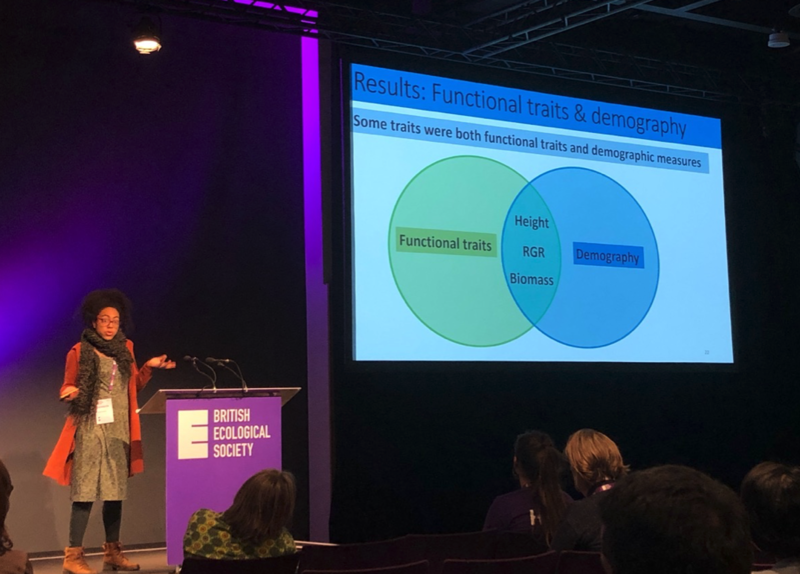
Connor Bernard (PhD student)
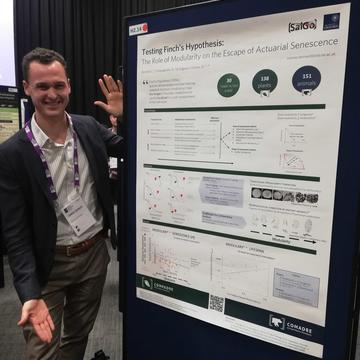
James Cant (PhD student, co-advised with Maria Beger @ Leeds)
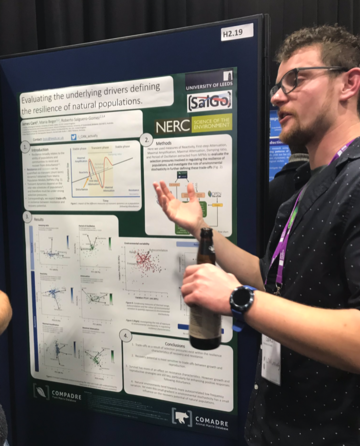
Courtenay Ray (PhD student, visitor from UC Berkeley)
The research presented at BES 2019 demonstrated the advances that ecologists have made to close gaps and challenge assumptions in ecology. One of my favorite talks exemplifying this was from Dr. Stephanie Hampton who discussed the rise of winter lake ecology due to the finding of high biotic activity below ice, an environment previously considered to be dormant. In another favorite talk, Dr. Sasha Wright shared the results from an elegant experiment testing whether the positive correlation between plant microclimate modification and diversity is driven by biotic or abiotic processes. To do this her team compared microclimate in pots with living plants to those with only dead plant material (no roots) and found that biomass alone was insufficient to explain microclimate modification from higher diversity. This was my first time attending BES and I am looking forward to future meetings.
[ESP] La investigación presentada en la BES 2019 demostró los avances que los ecólogos han hecho para cerrar las brechas y desafiar las asunciones en ecología. Una de mis charlas favoritas que ejemplifica esto fue de la Dra. Stephanie Hampton, quien discutió el surgimiento de la ecología de los lagos de invierno debido al hallazgo de alta actividad biótica debajo del hielo, un ambiente que anteriormente se consideraba inactivo. En otra charla favorita, la Dra. Sasha Wright compartió los resultados de un elegante experimento que prueba si la correlación positiva entre la modificación y la diversidad del microclima de la planta está impulsada por procesos bióticos o abióticos. Para hacer esto, su equipo comparó el microclima en macetas con plantas vivas con aquellas con solo material vegetal muerto (sin raíces) y descubrió que la biomasa sola no era suficiente para explicar la modificación del microclima de mayor diversidad. Esta fue la primera vez que asistí a BES y espero con ansias futuros meetings.
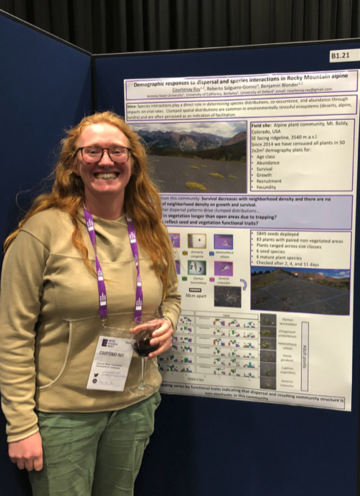
Gabriel Santos (PhD student, visitor from Brazil)
The BES was amazing with a lot of exciting projects and inspiring talks, however, the crème de la crème was the early career workshop where brilliant researchers shared tips and tricks that they believed were critical for their career. It’s made me confident that I'm in the right way for a successful academic career. I'm coming back to Brazil in February but now thanks for this workshop, I'm confident that I will come back soon for the SalGo team.
[POR] O BES foi maravilhoso, cheio de projetos interessantes e apresentações inspiradoras, entretanto, a cereja do bolo foi o workshop para pesquisadores em estágio inicial da carreira onde pesquisadores brilhantes compartilham dicas e truques que eles acreditam terem sido cruciais em sua carreira. Isso me deixou bastante confiante de que eu estou no caminho certo para uma carreira acadêmica de sucesso. Eu volto para o Brasil em Fevereiro, mas graças a esse workshop eu estou confiante que voltarei logo para o SalGo team.
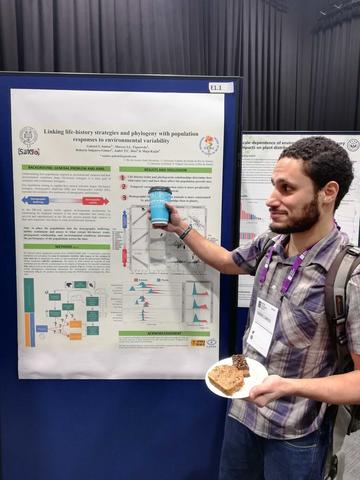
Pol Capdevila (research fellow)
What a conference! It is really hard to highlight just one thing - I am still hangover from all the things that I have experienced in Belfast these days. This year was my second time at the BES, but in only one year it has started to mean something more than just a conference for me. This year, the BES became a place where I could meet again some friends that I have made during this year as a postdoc at Oxford. Not only that, this year was very special for me because for the first time at the BES I chaired two sessions (motivated by discussions with Rob), one on Metabolomics, together with Tom Walker, and another one about Resilience, with Iain Stott. Both sessions were really great. I was particularly motivated by the resilience one, which was the one that I was more involved and leading the most. The speakers were great, all of them, without exception in both sessions, and the interactions with them where even better. I also gave a talk in my session, which was rather intimidating because it was in the large auditorium. However, the feeling that I had when I finished is something that I won’t forget in a long time. Also, I had the opportunity to meet some senior editors and editorial board from Journal of Ecology and Journal of Animal Ecology. At that meeting, we discussed the organisation of a Cross-Journal Special Feature about Resilience (open call starting early next year). In that Special Feature I am going to act as a guest editor together again with Iain Stott and Rob, which to me is really exciting! I also had a nice chat with two editors from Frontiers in Ecology and Evolution. It was really interesting doing so because they are a relatively new journal with innovative editorial and peer review systems. Finally, and perhaps most importantly, I enjoyed the discussions in general with the other researchers and saw presentations by other members in the group where I work. I guess, this BES has meant a lot for me as it was a manifesto of my current transition towards a more developed researcher. Only time will tell if my words are just a result of an emotional hangover or that this year. I really experienced one of the BESt conferences I ever attended…
[CAT] Quina conferència! És realment difícil destacar només una cosa: encara estic una mica trasbalsat de totes les coses que he viscut a Belfast aquests dies. Aquest any ha estat el segon cop que anava al congrés de la British Ecological Society, però en només un any aquest esdeveniment ha començat a significar molt més que una simple conferència per a mi. Aquest any, el BES es va convertir en un punt de retrobada amb dels amics que he fet durant aquest any com a post doc a Oxford. No només això, aquest any ha estat molt especial per a mi, ja que per primera vegada al BES vaig presidir dues sessions (motivades per discussions amb en Rob), una sobre Metabolòmica, juntament amb Tom Walker, i una altra sobre Resiliència, amb Iain Stott. Les dues sessions van ser realment excel·lents. Em va motivar especialment la de Resiliència, que va ser en la que vaig estar més implicat com a líder. Els ponents van ser excel·lents, tots ells, sense excepció, en les dues sessions, i les interaccions amb ells encara van ser millors. També vaig fer una xerrada a la sessió de Resiliència, que va ser molt intimidatòria, ja que va tenir lloc a l'auditori gran. Tot i això, la sensació que vaig tenir quan vaig acabar no l'oblidaré mai. També vaig tenir l'oportunitat de conèixer alguns editors de les revistes Journal of Ecology i Journal of Animal Ecology. En aquella reunió, es va parlar de l'organització de la publicació d'una edició especial sobre resiliència (convocatòria oberta a principis de l'any que ve). En aquesta edició especial actuaré com a editor convidat juntament amb Iain Stott i Rob, que per a mi és realment emocionant! També vaig tenir una conversa molt agradable amb dues editores de la revista Frontiers in Ecology and Evolution. Va ser realment interessant fer-ho perquè són una revista relativament nova amb sistemes editorials i de revisió molt innovadors i d'avantguarda. Finalment, i potser el més important, vaig gaudir dels debats amb molt bons investigadors i vaig veure presentacions d'altres membres del grup on treballo. Suposo que aquest BES ha significat molt per a mi, ja que era un manifest de la meva transició actual cap a un investigador més "sènior". Només el temps dirà si les meves paraules són només el resultat d'una ressaca emocional d'aquest any. Tanmateix, per mi aquest any va ser una de les millors conferències que mai he assistit...
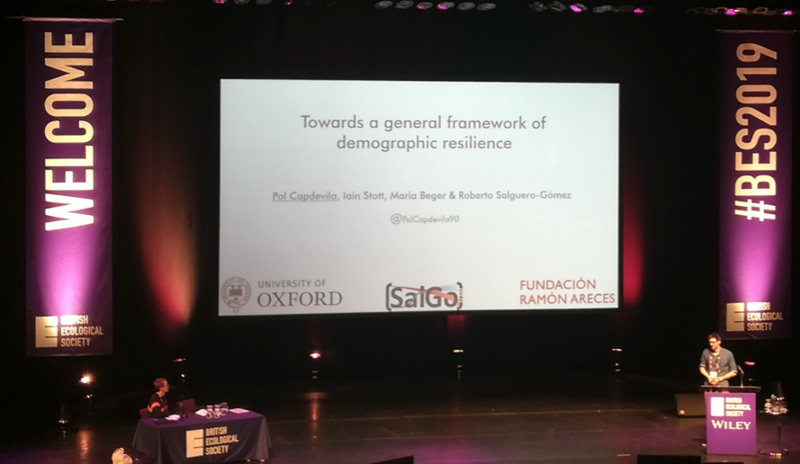
Gesa Römer (PhD student; visitor from SDU, Denmark)
One of the things I really like about BES is the diversity of topics. You always have opportunities to learn about something outside your own field of research. The most entertaining opportunity for this is the BES Science Slam, where various topics are presented in an unconventional way. This year we had a rapper, a drag queen working with bees, an interactive food web, and a Christmas song about the ecological inaccuracy of Christmas cards. For me, the Science Slam is an amazing way to get your brain cells AND your laughing muscles to work, and spend time with friends after a conference day.
[DEU] Eines der Dinge, die ich an BES sehr mag, ist die Themenvielfalt. Man hat immer die Möglichkeit, sich über Forschungsgebiete außerhalb des eigenen Schwerpunkts zu informieren. Die lustigste Möglicheit dafür ist der BES Science Slam, bei dem verschiedene Themen auf unkonventionelle Art und Weise präsentiert werden. Dieses Jahr hatten wir einen Rapper, eine Drag Queen, die mit Bienen arbeitet, ein interaktives Nahrungsnetz und ein Weihnachtslied über die ökologische Ungenauigkeit von Weihnachtskarten. Für mich ist der Science Slam eine großartige Möglichkeit, seine Gehirnzellen UND Lachmuskeln zum Arbeiten zu bringen und nach einem Konferenztag Zeit mit Freunden zu verbringen.
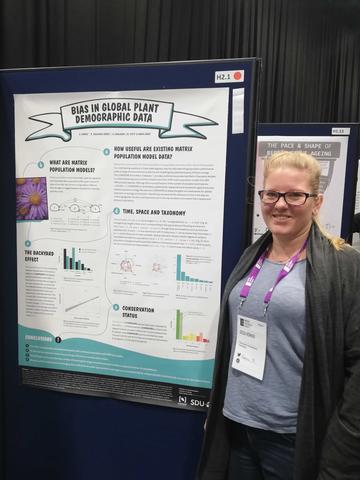
Rob Salguero-Gómez
This year was a rather hectic BES because I had undergraduate admission interviews back at Oxford right in the middle of the BES. This meant that I didn’t get to see much of the BES, and all of the activities that we at the SalGo team had planned (see above). Nonetheless, in addition to the wonderful talks by various researchers during the two thematic sessions that we organised (above; metabolomic functional traits and ecological resilience), and the feedback I got from students and ECRs on my talks on academic resilience and how to get published, I was very happy and proud to see members of the team represent the macro-ecological and demographic research that we carry out in our team. As in every year, I really enjoyed meeting with other core committee members of the COMPADRE and COMADRE database to discuss the progress that we have made up until now since the last year, and also plan a new round of grants to keep on supporting the archiving of demographic information across the tree of life, as well as some really interesting macro-ecological research (stay tuned!). On the actual only day that I was able to attend the conference, I enjoyed the session that the BES Quantitative Ecology SIG put together on “Interdisciplinary model integration to better understand biodiversity change”. It was extremely humbling to see ECRs and senior researchers who have successfully mastered and brought together multiple disciplines to deliver conservation biology solutions, including physics, mathematics, statistics, economics and ecology, of course! I had a great lunch break chatting with Brian Enquist about the links between (functional) traits and demographic performance, and how to best include the role (or the confusing detraction) of biomass both in animals and plants. The session where I gave my talk (“Macroecology and Biogeography (Functional Traits & Diversity)”) was full of super interesting talks, including one by Owen Middleton, a PhD student who is archiving a remarkable amount of high-quality diet information for animals. I see great potential bringing together life history traits derived from COMADRE, density estimates from TetraDensity, and Owen’s dataset to explore questions on the performance of carnivores vs omnivores around the globe… so that’s where my brain is at the moment, in addition to eating mince pies!
[ESP] Este año me ha traido un BES bastante agitado porque estuve liado con entrevistas de admisión de licenciatura en Oxford justo en medio del BES. Ello significó que no pude ver mucho de BES y todas las actividades que habíamos planeado en el SalGo team (ver más arriba). Sin embargo, además de las fantásticas charlas de multiples investigadores en las dos sesiones temáticas que organizamos (arriba; rasgos funcionales metabolómicos, y resiliencia ecologica), y los comentarios sobre las charlas que di sobre resiliencia académica y como publicar, me siento muy feliz y orgulloso de ver a los miembros del equipo representar la investigación macroecológica y demográfica que llevamos a cabo en nuestro equipo. Como en todos los años, disfruté mucho de poderme reunir con otros miembros del comité central de la base de datos COMPADRE y COMADRE para discutir el progreso que hemos logrado hasta ahora desde el año pasado, y también planear una nueva ronda de subvenciones para seguir apoyando el archivo de información demográfica a través del árbol de la vida, así como algunas investigaciones macroecológicas realmente interesantes (¡estad atentos!). En el único día en que pude asistir a la conferencia, disfruté de la sesión que el BES Quantitative Ecology SIG organizó sobre "Integración del modelo interdisciplinario para comprender mejor el cambio de la biodiversidad". ¡Fue extremadamente alentador ver a investigadores juniors y seniors que han dominado y reunido con éxito múltiples disciplinas para ofrecer soluciones de biología de la conservación, incluidas la física, las matemáticas, las estadísticas, la economía y la ecología, por supuesto! Almorcé con Brian Enquist, con el cual charlé sobre los vínculos entre los rasgos funcionales y el rendimiento demográfico, y sobre cómo incluir mejor el papel (o la detracción de su confusión) de la biomasa tanto en animales como en plantas. La sesión donde di mi charla ("Macroecología y Biogeografía (Rasgos Funcionales y Diversidad)") estuvo llena de charlas súper interesantes, incluida una de Owen Middleton, un estudiante de doctorado que está archivando una cantidad notable de información de dieta de alta calidad para animales. Veo un gran potencial en la integración de los rasgos de la historia de vida derivados de COMADRE, las estimaciones de densidad de TetraDensity y el conjunto de datos de Owen para explorar preguntas sobre el rendimiento de carnívoros vs omnívoros en todo el mundo ... así que ahí es donde está mi cerebro en este momento, además de en comer pastelitos de navidad!
